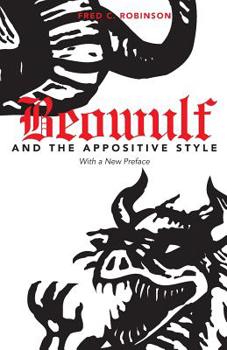Beowulf and the Appositive Style
Select Format
Select Condition 
Book Overview
Originally published in 1985, Fred T. Robinson's classic study asserts that the
appositive style of Beowulf helps the poet communicate his Christian vision of pagan
life. By alerting the audience to both the older and the newer meanings of words, the
poet was able to resolve the fundamental tension which pervades his narration of
ancient heroic deeds. Robinson describes Beowulf's major themes and the grammatical and stylistic
aspects of its appositive strategies. He then considers the poet's use of the semantically
stratified vocabulary of Old English poetry to accommodate a partly Christian and
partly pre-Christian perspective on the events being narrated. The analysis draws
attention to the ways in which modern editors and lexicographers have obscured stylistic
aspects of the poem by imposing upon it various modern conventions. Appositional techniques, Robinson shows, serve not only the poet's major themes
but also his narrative purposes. A grasp of the fundamental role played by the appositive
style in Beowulf gives the reader new ways of understanding some of the epic's familiar
passages. The new foreword addresses the reception this book has had and examines
recent scholarship in the ongoing interest in this amazing poem.
appositive style of Beowulf helps the poet communicate his Christian vision of pagan
life. By alerting the audience to both the older and the newer meanings of words, the
poet was able to resolve the fundamental tension which pervades his narration of
ancient heroic deeds. Robinson describes Beowulf's major themes and the grammatical and stylistic
aspects of its appositive strategies. He then considers the poet's use of the semantically
stratified vocabulary of Old English poetry to accommodate a partly Christian and
partly pre-Christian perspective on the events being narrated. The analysis draws
attention to the ways in which modern editors and lexicographers have obscured stylistic
aspects of the poem by imposing upon it various modern conventions. Appositional techniques, Robinson shows, serve not only the poet's major themes
but also his narrative purposes. A grasp of the fundamental role played by the appositive
style in Beowulf gives the reader new ways of understanding some of the epic's familiar
passages. The new foreword addresses the reception this book has had and examines
recent scholarship in the ongoing interest in this amazing poem.
Format:Paperback
Language:English
ISBN:0870495313
ISBN13:9780870495311
Release Date:April 2014
Publisher:Univ Tennessee Press
Length:106 Pages
Weight:0.38 lbs.
Dimensions:0.6" x 6.0" x 9.0"
Customer Reviews
0 rating





